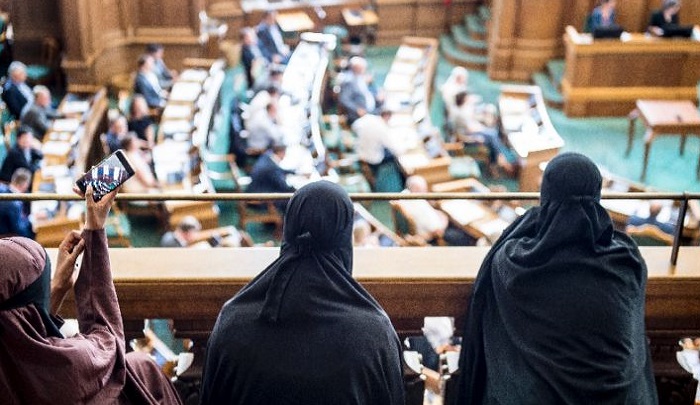GERMANY: COURT RULES AGAINST HIJAB IN COURTROOMS; SMASHES EFFORT TO “ENSHRINE SHARIA LAW IN GERMAN LEGAL SYSTEM”
GERMANY: COURT RULES AGAINST HIJAB
IN COURTROOMS; SMASHES EFFORT TO “ENSHRINE SHARIA LAW IN GERMAN LEGAL SYSTEM”
BY CHRISTINE DOUGLASS-WILLIAMS
republished below in full unedited for informational, educational and research
purposes:
Germany’s Federal Constitutional Court has made a groundbreaking ruling which has favored the constitutional rights of the people over the argument of religious rights of Muslim women to wear the Islamic headscarf in German courtrooms.The case involves a 38-year-old German-Moroccan law student who was born in Frankfurt and customarily wears a headscarf in public. In January 2017, she began legal training in the German state of Hesse, where the law bans any expression of religion in its courtrooms for judges, lawyers and legal trainees.Some, like the author below, believe that “the court’s landmark ruling effectively smashes a backdoor effort to enshrine Sharia law into the German legal system.” The Moroccan law student’s lawyer has called the ban “tantamount to a declaration of war.” And that it is. The tenets of Islam mandate war between disbelieving countries (dar al harb) and Muslim ones (dar al Islam). There is an ongoing effort in Western countries to impose Islamic values; the two main areas of conflict have been the Islamic veil and free speech.It isn’t enough that human rights abuses against women and religious minorities are a norm in Sharia states. Those who uphold the sharia — regarded as divine, immutable law in Islam — want to see Sharia imposed globally. This is a tenet of the Islamic faith.“German Court Blocks Attempt to Enshrine Sharia Law,” by Soeren Kern, Jewish Voice, March 5, 2020:Germany’s Federal Constitutional Court has ruled that the constitutionally guaranteed religious freedoms of Muslims can be curtailed if public displays of religiosity — in this case wearing Islamic headscarves in German courtrooms — endanger the ideological and religious neutrality of the state.The court’s landmark ruling effectively smashes a backdoor effort to enshrine Sharia law into the German legal system.The case involves a 38-year-old German-Moroccan law student who was born in Frankfurt and customarily wears a headscarf in public. In January 2017, she began legal training in the German state of Hesse, where the law bans any expression of religion in its courtrooms for judges, lawyers and legal trainees.According to the law, legal trainees (Rechtsreferendar) are allowed to wear a headscarf — except when they are performing certain official tasks in which they serve as representatives of the judiciary or the state. This means, for instance, that trainee lawyers are not allowed to wear a headscarf when presiding over a hearing, taking evidence or representing the public prosecution office.The complainant filed a lawsuit claiming that the headscarf ban interfered with her right to freedom of religion. She argued that she was being forced to choose between performing the intended tasks or fulfilling a religious clothing requirement that she considers imperative.The Higher Regional Court (Oberlandesgericht) ruled that, according to the law in Hesse, legal trainees have a duty to conduct themselves neutrally with respect to religion and that, when wearing a headscarf, the complainant was therefore barred from performing any tasks in the course of which she might be perceived as being a representative of the justice system or the state.The complainant filed an appeal, which was rejected by the Hesse Higher Administrative Court (Verwaltungsgerichtshof). She then filed an appeal with the Federal Constitutional Court, which affirmed the lower court rulings. In a statement published on February 27, 2020, the high court explained:“The principle of the state’s religious and ideological neutrality can be considered a constitutional interest that may justify an interference with freedom of religion in this case. The state’s duty to be neutral necessarily also entails a duty for public officials to be neutral since the state can only act through individuals. However, when public officials exercise their fundamental rights as private individuals in the performance of their duties, this cannot be attributed to the state in every case. Yet it can potentially be attributed to the state in cases where the state has specific influence on the visible character of an official act — as is the case in the justice system.“Freedom of religion can be subject to a further constitutional limitation inherent in the Basic Law (Grundgesetz): the proper functioning of the justice system in general, which is one of the essential elements underpinning the rule of law and is firmly rooted in the values enshrined in the Basic Law, given that every court decision ultimately serves to safeguard fundamental rights.“The proper functioning of the justice system requires that society not only place trust in individual judges, but also in the justice system in general. It is true that it will not be possible to achieve absolute trust among the entire population. However, it falls to the state to improve levels of trust. In the present case, the negative freedom of religion afforded parties to legal proceedings is also an argument in favor of the ban on wearing a headscarf.“In the justice system, the state exercises public authority vis-à-vis the individual in the classic hierarchical sense, which gives rise to more serious impairments than public authority exercised in interdenominational state schools, which are meant to reflect society’s pluralism in religious matters….“From a constitutional-law perspective, the legislature’s decision to establish a duty of neutral conduct with respect to ideological and religious matters for legal trainees must therefore be respected….“In support of the complainant’s position, it must be taken into consideration that to her, the headscarf is not only a sign of affiliation with a certain religious group that could be taken off at any time — like, for example, the cross worn on a necklace. Rather, wearing the headscarf to her means fulfilling a requirement that she considers imperative. As there is no similarly widespread equivalent requirement in the Christian faith, a general ban on manifestations of religious belief has a stronger impact on the complainant than on other religious public officials….“In support of the constitutionality of the ban, it must be taken into consideration that it is limited to a few individual tasks. The ban applies where legal trainees perform judicial tasks, represent the public prosecution office in trial hearings and take on quasi-judicial roles. In doing so, legal trainees — like civil servants — must represent the values that the Basic Law lays down for the justice system.”Hesse’s Minister of Justice Eva Kühne-Hörmann (CDU) described the ruling as “groundbreaking” (wegweisend):“With this groundbreaking decision, the court sent an important signal in favor of the ideological neutrality of state institutions. Especially in today’s society, in which people from many countries around the world live with different cultural biographies and also with different religions, the state order must place more value than ever on its ideological neutrality. This is only possible if the state parties to judicial proceedings are not allowed to show religious insignia.”…

